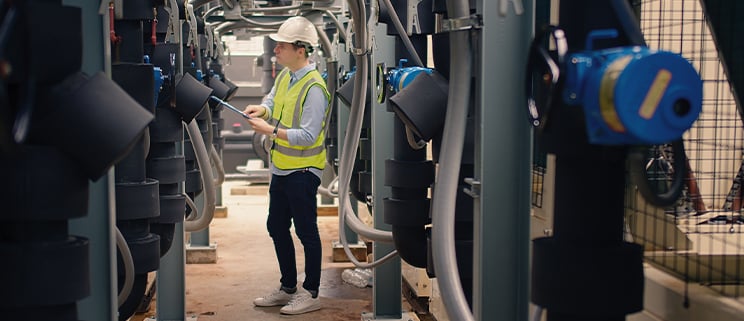Beyond data collection: Turning BMS data into business savings
ArticleSeptember 24, 2024
In today’s competitive landscape, businesses are looking for ways to optimise operations and reduce costs.
However, many are missing the untapped potential within their Building Management Systems (BMS).
While these systems collect vast amounts of data, the challenge lies in transforming it into actionable insights that drive cost savings and operational efficiencies.
Solving this puzzle can reveal significant savings, but you have to know where to look.The challenges of traditional BMS systems
The challenges of traditional BMS systems
A traditional BMS is designed to control and monitor systems like HVAC (heating, ventilation and air conditioning), lighting and security. The data it collects is difficult to access and understand, which is a significant drawback for Building Managers and Operations teams. It’s difficult to spot inefficiencies and predict maintenance needs, resulting in higher operational costs and increased risk of equipment failure.
Uncovering Hidden Efficiencies in Buildings
Buildings are complex ecosystems where small inefficiencies can lead to significant waste. On average, 30% of energy use in commercial buildings is wasted due to inefficiencies. Identifying and addressing these inefficiencies can unlock substantial cost savings and improve a building’s environmental footprint.

From data to actionable insights
The key to transforming BMS data into cost savings lies in advanced analytics and real-time monitoring. By leveraging sophisticated data analysis, organisations can gain a deep understanding of their building operations. This involves:
- Identifying inefficiencies: Advanced analytics can pinpoint where systems are not performing optimally, such as HVAC systems working against each other or unnecessary energy use during non-operational hours.
- Predictive maintenance: Real-time data allows for predictive maintenance, identifying potential issues before they become costly problems. This proactive approach can significantly extend the lifespan of equipment and reduce downtime.
- Optimising energy use: Data-driven insights can help optimise energy consumption by adjusting system operations based on actual usage patterns. This not only cuts costs but also contributes to carbon reduction targets.
The benefits of transforming BMS data into actionable insights extend beyond cost savings.
- Enhanced operational efficiency: Streamlining building operations leads to smoother, more efficient processes, reducing downtime and improving overall performance.
- Risk management: Proactive maintenance and real-time monitoring help identify and mitigate risks before they escalate, protecting assets and ensuring business continuity.
- Environmental ambitions: Optimising energy use supports sustainability initiatives, monitoring carbon emissions gives data to feed into regulatory reporting requirements.
- Employee comfort and productivity: Better-managed buildings create more comfortable environments, which can enhance occupant wellbeing and productivity.

The opportunity to transform building management
Organisations now have the opportunity to use BMS data to drive significant cost savings and operational efficiencies. With advanced analytics and real-time monitoring, businesses can uncover hidden inefficiencies, optimise energy use and enhance overall building performance long term.
Zurich insite delivers real-world savings
One simple BMS add-on can unlock your data and give you the actionable intelligence you need to spot energy savings. Zurich insite from Zurich Resilience Solutions (ZRS) brings global expertise and best-in-class risk engineering to the forefront of building management. It’s a small, observer device that listens to your BMS and translates raw data into valuable knowledge and action points.

Office saves over £5,000 a year by changing heating schedules
Situation: An analysis of office buildings revealed that heating systems were activating hours before occupancy and running late into the evening, even when the building was unoccupied.
Action: By adjusting heating schedules, one office building reduced energy consumption by 10-15%, translating to annual savings of £5,000-£7,500.

School reduces energy use by 25% by adjusting water heating systems
Situation: Schools managed under a facilities management contract identified inefficiencies in hot water heating systems and operational schedules.
Action: Adjustments reduced energy use by 25% in the first year, creating a more comfortable learning environment and demonstrating contract assurance 3.

Gain wider organisational benefits
Want to learn more about how Zurich insite can help you optimise your building’s performance and unlock hidden efficiencies? Click the link below to find out more.



